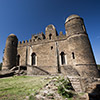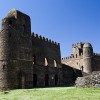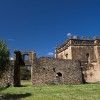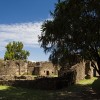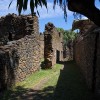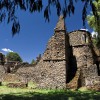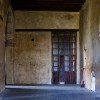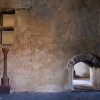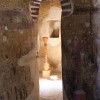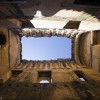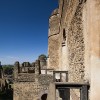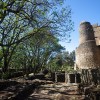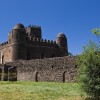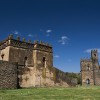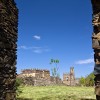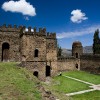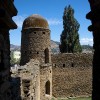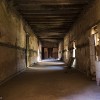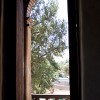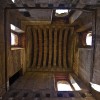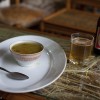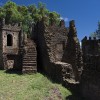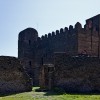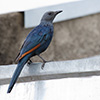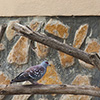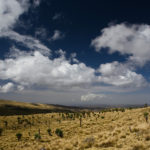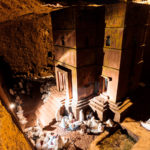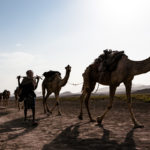Gondar – Little Ethiopia
When wandering through the streets of Gondar then you don’t only meet the royal palace. In many aspects and situations you will inevitably become an eye witness of a unique history and its achievements clashing with today’s African society. You’ll experience Ethiopia in small.
Being home of Axum and Gondar, Northern Ethiopia is one of the historically and religiously most important centres of East Africa and in particular in Gondar () it was possible to conserve and even reconstruct many cultural assets. The city centre of Gondar is dominated by the remainings of emperor Fasilides’ castle, the so called Royal Enclosure or Fasil Ghebbi, how the locals use to say. Even if you don’t see its towers, the omnipresent walls will surely angle your attention. To many tourists Gondar is an important stopover on the way to the Abyssinian highland, as in Debark, the last outpost of civilisation before indulging in the wild and rugged Simien Mountains, food supply & co aren’t playing in the major league.
Having barely arrived at Gondar’s airfield, already the taxi driver will confront you with THE African annoyance per se: you are white; hence you are rich; doesn’t matter if you also have to work for it, I’ll screw you and charge the triple or quad price. Everywhere in Ethiopia you will bump into a suchlike mentality, doesn’t matter if it’s about cents or some higher amounts. This can and will happen everywhere, even at the entrance of the Royal Enclosure. As for the admission charge there’s fortunately no chance to push it, but you once you walked out of the ticket booth you get told the fairytale of a mandatory guide who’s of course a matter of additional, if not to say double costs. The ticketing official, a lady, quickly let the story tellers and their lies fall silent.
The most impressive structure is definitely the main building of the royal palace and its defiant black towers. While strolling through the remainings of administrative buildings, a chapel and a school you will surely be watched from above by one of the countless hawks and vultures nesting around Gondar. From morning to noon they are circling in a thermal and sometimes gracefully descending down and having a seat somewhere around the palace towers.
Once having left the protecting walls of the Royal Enclosure behind, it doesn’t take much time until quiet and peace are over and you immerse into the soundscape and exhalations of an Ethiopian provincial capital. Rattling the blue Tuk-Tuks are edging their way through the people, blowing their Diesel exhausts right into your face. As soon as you can see and smell again, you already have to flee again, this time from a wildly honking coach that is pretty quickly coming closer. And of course, long live Murphy, your stout-hearted jump ends nowhere else than in a bigger pile of donkey pooh…
In love with my throttle pedal… The often preached Christian values don’t seem to have much influence on Ethiopian car driving. The way pedestrians are literally attacked testifies of the big lack of respect towards other people. Afterwards of course wailing is big if something or someone was hit or even ran over. In general Ethiopian traffic is something not to be sneezed at. Either they’re all driving Toyotas with stuck gas pedals, or their patterns of thought are dominated by a certain “Out of my way! Here I come…” mentality. At the latest when being catapulted a 140km/h fast towards Lalibela on a gravel road leading over steep rugged rocks you feel like a pig on roller skates and every instability makes your short co-driver life flash before the eyes.
Ethiopian infra structure is definitely a story for itself. Trains of the country’s only railway line are derailing literally almost every day and travelling overland is also often affected by improvisation and patience. Independent from road conditions and the manner of driving, even a small distance like 300km can mean a full day of travelling. Doesn’t matter if broken down minibuses, uncoordinated donkey herds on the road or stoned and completely hammered drivers (under Khat influence) – a travel through Ethiopia has definitely quite an adventure potential.
For example the bus ride from Gondar to Addis Ababa makes demands on your time budgets as it takes two full days. Hence it’s not a big surprise that domestic flights of Ethiopian Airlines are quickly fully booked and sadly often drastically overbooked. Also it comes as no surprise that such a nice monopoly is the license to rip-off. Travellers having arrived Ethiopia with an international flight of Ethiopian Airlines get a rebate for domestic flights, but since that discount isn’t all-too generous, special offers of other airlines are definitely able to compensate (and even trump!) a non-given discount by Ethiopian Airlines.
Illegality aside, being in the second place after coffee production cultivation of Khat has become a very important industry in the past years. That stuff is often sold freshly cut on the roads. The minibus has just barely stopped and already you’ve got the brushwood right in your face.
Emperor Fasilides would surely turn over in his grave if he would know how his fellow countrymen are taking the tourists to the cleaner’s. Well, women have to be excluded from that statement as across the board they are treating tourists as humans, not as cow to be milked. Intractable and pushy like a Barclaycard huckstering door-to-door salesman, kids are giving their best to drag the cash out of your pockets. Telling farfetched stories about the situation at school, many tourists follow them to the bookstore. That the kid is asking for a school book fits the picture, but what the tourist doesn’t see is that after finishing the deal the book ends up at the store again, while profit is shared between bookseller and kid. Though, only the male are behaving that badly, women and girls stay out of this. The best baksheesh is a ball pen, making not only kid’s hearts skipping a beat.
Friends of my travel companions are sponsoring a group of students based in Lalibela. It is definitely a bit strange when a student is wearing the best clothing you can get, to boot changing it daily. Being asked for learning matters answers suddenly become pretty fuzzy. Also travellers should be careful when someone is offering spontaneous help as afterwards they always get (in-) directly charged for it, for example when hitching for a Tuk-Tuk. Never let a local do it for you or the fare will rise by factor 2 or 3.
As for getting food supply for the Simien Mountains, even in Debark things didn’t really change. Already the presence of our guide and his interventions in our deal caused us an 80% higher price. Surely we don’t speak about millions of Euros and all those negative things also have to be seen against a background of to some extent severe poverty. However, the local’s latent disposition to scam and fraud is quite a burden for any kind of interpersonal relationships. If I wouldn’t have experienced a different kind of Ethiopia, for example the Afar region or the fair way women are treating travellers, then I would seriously doubt to visit the country a second time. Beside countless ignorance-worthy “Hey Mister!” chants, there are fortunately about 10% upright and honest people, being either innately hospitable or just fair to tell you their price before.

